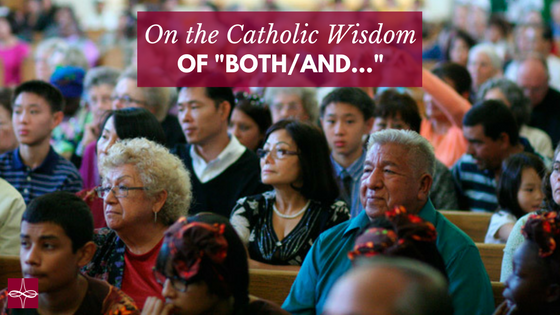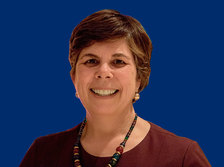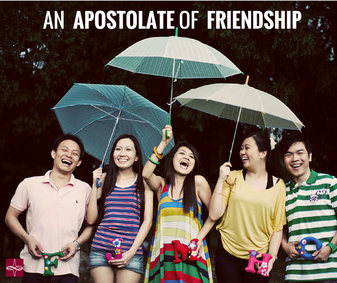|
“Serve the Lord with laughter.” It’s a quote from a favorite and incredibly popular saint that might surprise us, for the man who spoke these words was so deep, profound, and intentional that we might overlook the fact that he laughed. When we think of St. Padre Pio, we often instead focus on the deep wounds in his hands—the stigmata which he bore for 50 years—or his ability to levitate, speak with his guardian angel, read souls, or bilocate. Laughter seems too ordinary, perhaps, for sanctity. And yet, as a practical jokester and manager of mischief, I am drawn to this quote deeply—for I feel a personal apostolate of joy and am experiencing that call more starkly in a season in my life marked by exhaustion, stress, and transition. Some of my favorite saints and quotes from Scripture focus on the theme of joy. When asked to speak to a group at Theology on Tap several years ago, I chose “The Serious Call to Joy” as my topic. I love Psalm 34, which reads, “Look to him that you may be radiant with joy.” And I often meditate on Christ’s words to his disciples: “I have said these things to you, so that my joy may be in you, and that your joy may be complete” (Jn 15:11). Finally, a patron of our family is St. Philip Neri, who was lovingly nicknamed “Apostle of Joy.” My son John Philip was even born on his feast day and shares his name. When I think of what I want to be called after my death, I can’t think of anything better than that title given to St. Philip Neri (apart from, perhaps, being known as the Patron Saint of Bacon). To me, joy just seems like the natural fruit of holiness—a sure sign of a deep and profound relationship with Christ. Pope Francis himself has noted this—dedicating an entire encyclical to the joy of the Gospel. He made waves when publishing the encyclical because he said there was no room in evangelization for “sourpusses”—the first time any such term has appeared in a papal document. He explains, “Proclaiming Christ means showing that to believe in and to follow him is not only something right and true, but also something beautiful, capable of filling life with new splendor and profound joy, even in the midst of difficulties.” I think now of joy perhaps because I’m seeing so little of it in general. The world seems bogged down by burdens greater than we think we can bear. And being 8 months pregnant, I find myself a bit bogged down physically and emotionally, too. But, Pope Francis reminds us that the joy of Christ is possible even in the midst of our suffering and hardship. This does not diminish our suffering, nor does it erase or ignore it, but points out that Christian joy can transcend and transfigure suffering. So, when I came across Padre Pio’s quote on his feast day earlier this month, it was a powerful reminder of my call to laughter—or at least of my commitment to being an apostle of joy. Pope Francis continues, “Joy adapts and changes, but it always endures, even as a flicker of light born of our personal certainty that, when everything is said and done, we are infinitely loved.” (EG, 6) The knowledge that I am infinitely loved despite my frailty and littleness, especially in this season of pregnancy, is what beckons me ever onward. If I think of my life right now, I don’t know how else to keep going other than by laughing. I look down to find crumbs and stains dotting my bulging belly. My goal most days is not to waddle while walking. I find myself stopping mid-sentence because I forgot my train of thought or walking into a room to get something just to leave puzzled, muttering to myself. Turning over in bed practically requires the use of a crane. And I face my staircase each day with the determination of one climbing Mt. Everest. Humor aside, if we turn to Scripture, we find a love story saturated with calls and invitations to joy. From the Old Testament to the New, God speaks to us throughout salvation history because he wants to restore his creation to be “man fully alive.” For me, someone who is “fully alive” is a person of joy that radiates love wherever they go. As our world and society continue to navigate times of hardship, transition, and injustice, and as you personally continue to navigate your own crosses (whether they be staircases or not), I invite you to ask St. Padre Pio and other holy men and women to help teach you the secret of joy that comes from “the certainty that Jesus is with us and with the Father.” May we all become apostles and ambassadors of joy to a world thirsting for Christ’s love and may we find creative and nourishing ways to serve the Lord with laughter. As Pope Francis quotes Paul VI saying, “Let us recover and deepen our enthusiasm, that ‘delightful and comforting joy of evangelizing, even when it is in tears that we must sow… And may the world of our time, which is searching, sometimes with anguish, sometimes with hope, be enabled to receive the good news not from evangelizers who are dejected, discouraged, impatient or anxious, but from ministers of the Gospel whose lives glow with fervor, who have first received the joy of Christ.[6]’”
1 Comment
On July 1-4, 2017, Catholic dioceses and organizations reflecting the diversity of the Catholic Church in the United States will convene for a Convocation of Catholic Leaders in Orlando, FL. Approximately 3,000 people representing over 155 dioceses and numerous church organizations will meet to discuss methods and ideas for making Pope Francis’ vision of a “missionary option” for Church ministries and activities a reality in the United States. This unprecedented event is being called and organized by the US bishops, signifying the importance of such an event as a necessary step for Catholics in the Church today to live as missionary disciples filled with the “Joy of the Gospel.” While those who are attending the Convocation are already Church leaders, they look to the guidance of the bishops in order to help them tackle their particular pastoral challenges and foster opportunities for growth.
The Catholic Apostolate Center has been invited by the United States Conference of Catholic Bishops (USCCB) to collaborate on the planning of the Convocation, as well as to attend as a sponsor and exhibitor in order to share our ministry and promote our work of fostering evangelization. Center Director, Fr. Frank Donio, S.A.C. will be speaking at the Convocation to help guide and foster dialogue among the participants. The Center is also collaborating with the USCCB to develop and distribute the Participant Guidebook and Journal and collaborate with them on pre-Convocation webinars. One webinar provides the theological basis of the Convocation. Another webinar discusses the practical layout and methodology of the event. The mission of the Catholic Apostolate Center is to revive faith, rekindle charity, and form apostles through the lens of Pallottine spirituality. Our patron, St. Vincent Pallotti, believed that all the members of the Church are called to collaborate in spreading the Gospel. “The Catholic Apostolate, that is, the universal apostolate, which is common to all classes of people, consists in doing all that one must and can do for the great glory of God and for one’s own salvation and that of one’s neighbor,” St. Vincent Pallotti said. The Catholic Apostolate Center further hopes to help dioceses, organizations, and ministries better collaborate with each other and find ways to share the resources we have as a Church. The Convocation of Catholic Leaders will be a monumental event for the Church in the United States which we hope will bear much fruit. For those attending, I invite you to read, reflect, and pray for the openness of the Holy Spirit in guiding your participation during the Convocation. We also invite attendees to visit our exhibit to learn more about our resources and work. At the Catholic Apostolate Center, we are always interested in collaborating and working together to form apostles for our Church. For those that will not be able to attend, please pray for the participants and organizers of the Convocation, that they may be open to the Holy Spirit to guide their efforts. May he help us become missionary disciples, or as our Patron St. Vincent Pallotti would say, apostles, in the United States. To learn more about the Convocation for Catholic Leaders, please visit the USCCB website by clicking here. For additional information and resources, we invite you to visit our website by clicking here.  Sometimes it is not one or the other, but rather both/ and. I have been thinking and praying about this a lot over the last two weeks. I live on Capitol Hill in Washington D.C. and have witnessed some of the largest marches and demonstrations that I have seen in the last twenty years. I’ve also been reading a lot of signs that the marchers and protesters carried. If you looked only at the signs, you would think we live in a world defined by competing principles and all of us are being called to take sides and battle it out until one side goes down in defeat. This serves no one well.Some of our most volatile issues of the day are not a battle of competing goods, but rather a battle that accepts no middle ground. We often lack the humility to recognize we might actually be talking about complementary principles and goods. For example, take the question of immigration. Most people would agree that a country has a right to secure its borders and most people agree that we have an enormous problem at present where many people’s homelands have become unlivable. Most people would agree that people have a right to seek justice and peace, in a safe community. It seems the discussion we should be having is how we manage to control our borders and respond to the need for safe passage to safer communities for millions of refugees who are displaced from their homelands. Who is having that conversation? Well, the Catholic Church, for one! Our faith is grounded in balancing in a life-giving creative way the tension of both/and. After all, we talk about how belief is rooted in faith and reason. We believe that justice should be wrapped in mercy. We know that with sin, there is always the possibility of grace. This ability to see the complementary goods has never been on bigger display than this past week. The week began with the United States Conference of Catholic Bishops issuing a strongly worded statement opposing President Trump’s executive order on Immigration. They write “We strongly disagree with the Executive Order’s halting refugee admissions. We believe that now more than ever, welcoming newcomers and refugees is an act of love and hope.” Here the Church draws on its principles of Catholic Social Teaching which holds both the right of people to migrate to “sustain their lives” and the right of a country to “regulate its borders and control immigration” (Catholic Social Teaching on Immigration and the Movement of Peoples). In the same week, many bishops and Catholic Pro-Life marchers welcomed the presence of Vice-President Pence who supports the work of the Pro-Life Movement. The Church both preaches against the sin of abortion and the right of every woman to have all the support she needs from the government and community to bring her child into the world. The Church will continue to advocate against abortion and, through ministries like Project Rachel, offer healing and hope to women and men touched by the experience of abortion. These two issues in the span of a week, highlight what many people find so confounding about the advocacy of the Catholic Church on behalf of social issues. We seem to some to be “always changing sides.” And that is just it, we don’t take sides. We stand in the truth of the Gospel of Life. Rather than getting tied up in political platforms and ideologies, the Church looks to the Gospel and in the harmony of truth and reason seeks always and everywhere to protect the dignity of the human person through the exercise of mercy and justice. Now, more than ever, our country needs the wisdom of a church that can navigate toward the common good by exercising both/and. We need to identify the common good within the issues on which we are so quick to take sides– and work together toward a shared good. What does a country look like that has a secure border and the ability to welcome people seeking peace, a job, a place for their children to thrive. What do support networks look like that would say we are a community who know women deserve better than having to choose an abortion and can provide for their care. What does a country look like that can promote the dignity of the human person and the common good of the community? These are questions that the Church has thought about for centuries and has some wisdom to share. Pope Francis believes that sharing that wisdom is part of our mission to the world today. He writes in The Joy of the Gospel, “Despite the tide of secularism which has swept our societies, in many countries – even those where Christians are a minority – the Catholic Church is considered a credible institution by public opinion, and trusted for her solidarity and concern for those in greatest need. Again and again, the Church has acted as a mediator in finding solutions to problems affecting peace, social harmony, the land, the defense of life, human and civil rights, and so forth. And how much good has been done by Catholic schools and universities around the world! This is a good thing! (65). Today, we all have an opportunity to bring this good thing to bear in our conversations and in our advocacy. Let’s be one of those schools! This post was originally published on the St. Joseph's College of Maine Theology Blog and was re-published with permission.
If you are anything like me, you find it difficult to discern God’s call, but sometimes Jesus makes it plain and simple in Scripture. For example, Jesus very specifically calls us friends (John 15:15). Friendship is a calling.
In my own faith journey, I continually find this actually a rather strange, startling summons. Jesus’ friendship is an unmerited grace-filled gift, which is desirable, but it also demands something of me, which is a bit frightening. On a day-to-day basis, nothing gives me, or most people I imagine, greater joy than faithful friendships. If we Christians lack Gospel joy, it goes to show among other things, that we are not heeding the call to be faithful friends of Jesus. Rediscovering friendship as a calling has challenged my paradigm for discerning my personal vocation. Friendship shapes both the context and content of my choices. Let me try to explain what I mean. A culture of friendship is an indispensable context for discerning a vocation. Faithful friends often know us better than we know ourselves. They help us discern our gifts, weaknesses, and purpose, and then encourage or challenge us to act in a way we couldn’t or wouldn’t on our own. Like the spiritual life in general, friendships are very often difficult to navigate. This is not because the path ahead is overly complicated, but because the next step usually lies in the darkness of the unknown. Friends who know our hearts invite us to step into the vulnerability with courage and bring our darkness into light. One example in my life is the young adult group I attend, the Baltimore Frassati Fellowship. We don’t focus on multiplying social activities, which too easily becomes another way to fill rather than sanctify our time. The Church teaches us to share each other’s time, not compete for it. We focus on cultivating an atmosphere of trust and virtue that counterbalances the typically transitory and fast-paced “young adult” phase of life. Our events are rather ordinary, but they are consistent and dependable: weekly adoration, regular service opportunities, and a larger monthly Holy Hour and social. Pretty soon, we all have to make decisions (something I’m bad at), so friendship also determines the content of our vocation. Paraphrasing John Henry Newman, each of us is called to some definite and unique vocation, which is centered in some specific friendship(s) (Meditations on Christian Doctrine, I.2). Here is a question to pray with: What kind of friendship am I called to, and with whom? I wasn’t always used to thinking about different “kinds” of friendships, so one helpful question I learned to ask while in seminary concerned the call to exclusive or inclusive friendships. Am I called to befriend one person like no other (marriage), to show no partiality and be a special part of many lives (religious life), or some other group? Moreover, since there is no greater love than “to lay down one’s life for one’s friends,” (John 15:13), friendship is also intrinsically sacrificial. Another form of the question is: Who is God calling me to daily lay down my life for: a spouse and children or on the altar of Eucharistic sacrifice? That’s what makes so special the radical witness of someone like Jean Vanier, the founder of L’Arche. Vanier felt called to leave behind an academic career to form a small community with persons with developmental disabilities where they could share their lives in faith and friendship. After 50 years, his original calling continues to grow and inspire others to embrace the joy, virtue, sacrifice, and particularity our friendships in Christ are meant to take. As part of the universal call to holiness though, evangelization involves going out and befriending others and inviting them to become friends of Jesus. Friendship, though it takes different forms, is an apostolate all are called to. Every Feast Day or Solemnity in which the Church honors Mary, it seems that with a great deal of consistency church music directors across the country choose to make (Composer’s) Hail Holy Queen a part of the Mass for that day. Without fail, whenever I hear this song, I can’t help but crack a smile as everything in me wants to break into the song and dance of Sister Mary Clarence and her fellow nuns found in the hit 1992 movie Sister Act.
Sister Act follows the story of Delores Van Cartier, a lounge singer in Reno who witnesses her lover, an undercover mafia member, murder one of his assistants. After escaping, authorities place her in witness protection at St. Catherine’s Convent where she takes on the guise of a nun, becoming Sister Mary Clarence. At first she has a great deal of difficulty keeping up with the daily schedule of early mornings, prayer, fasting and the simple lifestyle but soon finds a home putting her music background to work directing the choir (in much need of the help, I might add). A classic film among my family, I recently revisited this movie over the holidays. At one point there’s a conversation in which the Mother Superior chastises Sister Mary Clarence for sneaking out at night with the other sisters to visit one of the neighborhood bars. While the Mother Superior sees the convent’s walls as a means of protection, Sister Mary Clarence argues that they prevent the Sisters from going out into the community. Later we see a softening of the Mother Superior’s heart as she allows the Sisters to go out into the surrounding inner city neighborhood to meet and embrace the people. Not to mention, the improved musical styling of its choir, under Sister Mary Clarence’s directorship has struck a chord with the surrounding youth of the area (just look at marker 1:48 in the video). While these moments may scream of a 1990’s, somewhat cliché filmmaking style, today it also screams something else to me – the new evangelization. Once the sisters move beyond the walls of the convent they begin to take on what Pope Francis refers to in his Apostolic Exhortation, Evangelii Gaudium, as an “Evangelizing Community.” Pope Francis elaborates, saying, “An evangelizing community knows that the Lord has taken the initiative, he has loved us first (cf. 1 Jn 4:19), and therefore we can move forward, boldly take the initiative, go out to others, seek those who have fallen away, stand at the crossroads and welcome the outcast” (24). As we see images of the sisters jumping rope and dancing with teenagers on the street, handing out food to the homeless, creating a safe playground for children, and greeting patrons in front of a local adult video store, it’s clear they have embraced those on the fringes of society and welcomed them. Pope Francis emphasizes that “an evangelizing community is filled with joy; it knows how to rejoice always” (24). If there’s any doubt about the joy of these Sisters just listen to their rendition of Hail Holy Queen and try not to crack a smile the next time to you hear it at Mass. And don’t forget to share that joy with someone else! David Burkey is the Communications Coordinator for the Catholic Apostolate Center Following the new Congress being sworn into office January 3rd, Inauguration Day is now upon us. On this day, hundreds of thousands turn out on the National Mall in Washington and millions tune in on television to watch the great spectacle. President Barack Obama will raise his right hand and place his left on two stacked Bibles as he takes the oath of office for another four-year term.
Inauguration Days are joyous for some but disappointing for others. Yet as Catholics, we also understand that regardless of who wins the oval office, Christ has already won. Because of Christ’s victory, we are called to act with charity toward our fellow citizens and even those who are not citizens. Sacrificial love transcends party lines and political boundaries. This day is a reminder to us that our country is in need of being rooted in God and in our faith. Yet it cannot be done by one human being and through political methods. One of the unique and fascinating traits of St. Vincent Pallotti, founder of the Union of Catholic Apostolate, was his ability to get others involved in the mission of the Church. He understood that an internal revitalization of the Church or renewal of faith was not going to occur by a single individual. Rather, he envisioned the renewal of the Church as everyone’s task – everyone’s mission. St. Vincent Pallotti formed a small group of followers at the beginning of his ministry to use their talents to evangelize and spread the good news of the Gospel. We too are called to use the skills and talents that God has given us and as the motto of the Catholic Apostolate Center states, to “revive faith, rekindle love and form apostles.” This is what it means to participate in the universal apostolate. And since we are created “in the image and likeness of God,” each of us has spiritual gifts that can touch the hearts of others. Consider the official motto of our nation: “In God we trust.” What God asks of us is that we trust in Him at all times, whatever the circumstances and in whatever situation, including whoever is in office. We must submit to His will as the all-knowing, all-powerful and ever-living God. All we need to know about our future and the future of our nation is contained within the trust of His will. We may have the tendency to want to change the direction and determine the course because we think we know it all. But our intelligence and judgment will only take us so far because God we cannot perceive the things God has in store by our sheer intellect. His ways are spiritually discerned. “‘For my thoughts are not your thoughts, nor are your ways my ways,’ declares the Lord.” (Isaiah 55:8) The United States has long declared where this nation’s trust resides. Our country has historically placed trust in God. Presidents come and go and so does inaugural hype and rhetoric. But the message of Christ and Christ himself are the same yesterday, today and forever (cf. Hebrews 13:8). Sarah Morris is a senior Politics major at The Catholic University of America. |
Details
Archives
July 2024
Categories
All
|
About |
Media |
© COPYRIGHT 2024 | ALL RIGHTS RESERVED











 RSS Feed
RSS Feed